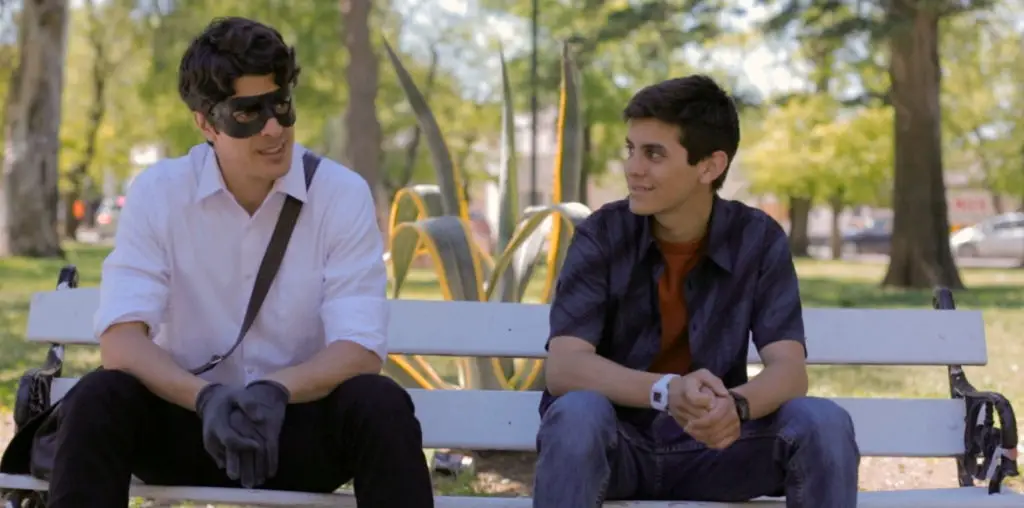
BOOTLEG FILES 365: “Reet, Petite and Gone” (1947 feature starring music legend Louis Jordan).
LAST SEEN: The full film is available on YouTube.
AMERICAN HOME VIDEO: On public domain labels.
REASON FOR BOOTLEG STATUS: No copyright was ever filed.
CHANCES OF SEEING A COMMERCIAL DVD RELEASE: There are too many issues to allow for a proper commercial release.
During the 1940s, singer/songwriter/bandleader Louis Jordan was known as the “King of the Jukeboxes” thanks to an astonishing string of hit tunes. Mixing jazz, R&B, blues and flippant comedy, Jordan’s creative output served as the soundtrack for a generation.
As an African American in a racially harsh era, Jordan and his Tympany Five band enjoyed an unusually high degree of crossover success with white audiences. But Jordan’s popularity could only go so far. Hollywood tapped him for brief guest appearances in the forgettable musical comedies “Follow the Boys” and “Swing Parade of 1946,” and his ebullient personality stole the show in both productions. However, no studio of that period was willing to put Jordan at the center of a feature-length film.
Running parallel to the Hollywood output during this period was a section of the independent cinema called the “race films.” These productions featured all-black casts and were distributed exclusively to theaters in predominantly African American urban centers. While these films lacked the polish and prestige of the Hollywood movies, at least they provided an opportunity for talented black performers to enjoy screen time in non-stereotypical roles.
Jordan, who made a few all-black short films in the early 1940s, was recruited to star in a 1946 feature-length race film called “Beware.” The commercial response to the film was strong enough for Jordan to be invited back for a second starring role. In 1947, he headlined in “Reet, Petite and Gone” – the title was taken from one of his hit songs.
“Reet, Petite and Gone” is something of a strange film. It only runs 67 minutes, yet it is packed with 14 songs. It is a shame that the production was not configured as a straightforward concert movie, since it is strictly B-movie connect-the-dots once the music stops and the plot resumes.
Jordan plays the singer/bandleader son of a wealthy man. He is trying to raise money for a Broadway revue, and his father’s death could mean that he would inherit enough funds to get his show on stage. However, his corrupt lawyer doctored the father’s will – and under the bogus decree, Jordan can only inherit his fortune if he marries a woman who meets an uncommonly precise set of measurements. None-too-coincidentally, the lawyer’s equally sneaky secretary matches the measurements perfectly. Jordan does not want to marry her.
Simultaneously, Jordan finds himself falling in love with an inspiring singer. In a coincidence that could exist in movies, she is the daughter of the woman that Jordan’s father once loved but was unable to marry. You can easily how all of this commotion winds up.
Fortunately, the surplus of music in “Reet, Petite and Gone” is so great that it literally shoves the silly plot out of the way. Among the highlights here are Jordan performing his raucous tunes “Wham, Sam (Dig Those Gams)” and “Ain’t That Just Like a Woman” while ultra-sexy dancer (who, sadly, is not identified in the credits) shakes her stuff. The combination of Jordan’s giddy personality and this mysterious woman’s sultry movements are combustible, and their time together represents some of the most enjoyable musical moments ever captured on film.
Jordan and his Tympany Five also provide an unexpected cover of the old-time children’s song “The Green Grass Grew All Around.” Their jazzy interpretation creates a rocking, rollicking new spin on a somewhat moldy old favorite, and Jordan’s pantomime of the song’s tree and avian occupant is priceless.
Jordan also happily steamrolls through his classics “Texas and Pacific,” “Let the Good Times Roll,” “That Chick’s Too Young to Fry” and the title tune. Each rendition is a joyful experience, and rarely has any musical film been so fully packed with so much tuneful spirit.
However, the film’s soundtrack is not entirely Jordan’s domain. Plus-sized vocalist June Raymond, who plays a supporting role as a comic confidante to Jordan’s girlfriend, belts out two romantic ballads. Bea Griffith, who plays both the girlfriend and (in flashback) her mother, duets with Jordan on “Tonight, Be Tender with Me.” Both women were very appealing performers, but they were unable to find any cinematic work beyond the race films – productions like “Reet, Petite and Gone” offer the only recorded evidence of their charms and talents.
Also featured in the cast are two actors who enjoyed a significant presence in the development of African American film talent. Lorenzo Tucker, who played the sleazy lawyer, was one of the major icons of the race films. Billed as “the black Valentino,” the handsome actor was a leading man in race films from the 1920s through the 1940s. “Reet, Petite and Gone” was unusual because it presented Tucker in a supporting role and as an unsympathetic character. Elsewhere in the film, in a small role, was Dots Johnson, who was best known as the maladjusted American MP stationed in postwar Naples in Roberto Rossellini’s 1946 classic “Paisan.” Sadly, neither Tucker nor Johnson was able to maintain a steady acting career following “Reet, Petite and Gone.”
Astor Pictures, a New York-based operation that handled race films along with reissues of older Hollywood titles, distributed “Reet, Petite and Gone.” The film’s release was, by all accounts, erratic – there is no record that it ever played theatrically in New York’s Harlem, the main showcase for race films – and it did little to boost Jordan’s music career, which started to wane by the end of the 1940s.
No copyright was filed on “Reet, Petite and Gone” and the film is a public domain title. Over the years, it has turned up on a number of labels specializing in public domain films – and the copies in circulation come from splicey, beat-up 16mm dupes. Restoring the film for a proper commercial release seems unlikely, since the original source material vanished a long time ago and Jordan’s music is still covered by copyright.
But even in a battered, orphaned format, “Reet, Petite and Gone” is a wonderful explosion of musical fun. The film is an invaluable preservation of Jordan’s considerable talents – yet while viewing the film, it is hard not to consider where Jordan’s film career could have traveled had he lived in a more progressive era.
IMPORTANT NOTICE: The unauthorized duplication and distribution of copyright-protected material, either for crass commercial purposes or profit-free s***s and giggles, is not something that the entertainment industry appreciates. On occasion, law enforcement personnel boost their arrest quotas by collaring cheery cinephiles engaged in such activities. So if you are going to copy and distribute bootleg videos and DVDs, a word to the wise: don’t get caught. Oddly, the purchase and ownership of bootleg videos is perfectly legal. Go figure!

